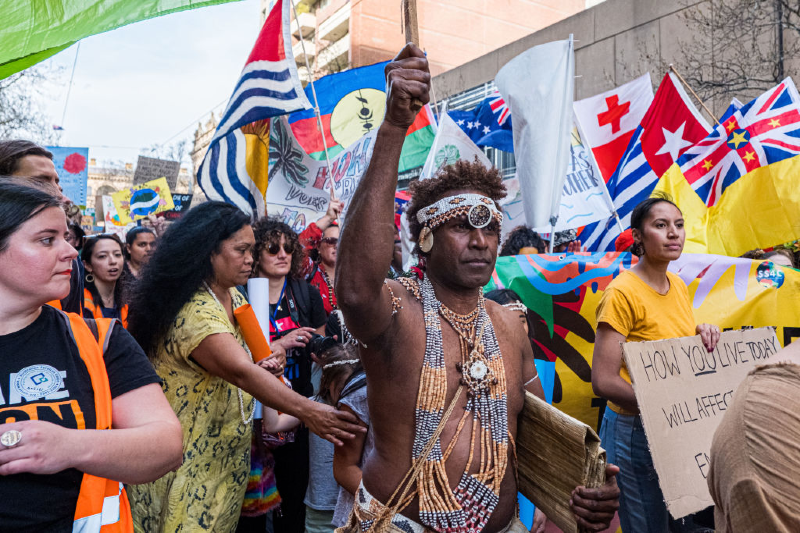The Australian government has been in the news this month for two seemingly contradictory policy responses to climate change. First, on 26 January, the Hon Sussan Ley, Minister for the Environment, attended the (first of its kind) Global Climate Adaptation Summit and committed Australia to join the global Call for Action on Raising Ambition for Climate Adaptation and Resilience, to developing a new National Climate Resilience and Adaptation Strategy, and pledged new climate finance of at least $1.5 billion over the next five years.

In apparent contrast to these new commitments, Australia’s recent update to its Nationally Determined Commitment (NDC) under the UNFCCC Paris Agreement made no increase to already mitigated ambition, sticking with the current paltry target of reducing emissions by 26 to 28 per cent below 2005 levels by 2030. A target that is shockingly unambitious. Doubling down on this lack of ambition, Australia has still not made a formal commitment to achieve net zero emissions by 2050, with Deputy Prime Minister Michael McCormack proclaiming, ‘We are not worried, or I’m certainly not worried, about what might happen in 30 years’ time.’ This makes Australia the only rich country to not have a net zero commitment in either law or policy.
McCormack and his colleagues in the National Party have also mooted quarantining emissions from industries such as agriculture and mining from any target Australia signs up to, with McCormack arguing, ‘There is no way we are going to whack regional Australia, hurt regional Australia, in any way shape or form just to get a target for climate in 2050’.
The government’s dogged refusal to commit to serious emissions reductions came under fire last week from Mathew Wale, Leader of the Opposition in Solomon Islands, who went on to invite the Australian High Commissioner to Solomon Islands ‘to join me in visiting my constituency of Aoke Langa Langa Lagoon to meet the people whose sea walls have toppled, whose food gardening areas are too salty to be useful, whose water sources are ruined and whose soup soup gardens are inundated by saltwater. He might explain to them how grateful they should be that Australia is providing billions to ensure jobs are kept in the Australian gas and coal industries.’
On a superficial level, it makes no sense to commit so strongly to managing the impacts of climate change (adaptation) on the one hand while refusing to significantly reduce emissions (mitigation) on the other. On the other hand, when you start to unpack the logic of so much adaptation policy, this contradiction fades away.
You see, all too often an ‘incrementalist’ or ‘adjustment’ approach dominates adaptation policy. This is typified by concepts like ‘climate-proofing’, which aims to ensure that the risks of climate change to existing or planned developments are ‘considered and, if necessary, managed’. The problem with this approach is that it tends to reinforce ‘development-as-usual’ — ultimately promoting the resilience of existing industries and economic systems, rather than the resilience of communities (particularly marginalised communities) or the biosphere.
'If there is a lesson for us here, beyond better understanding the real priorities of the Australian government, it is that we should be careful when calling for increased commitments to climate change adaptation and resilience.'
Here we can start to understand how refusing to commit to serious emissions reductions, and even calling for agriculture and mining to be quarantined from new targets, can be somehow compatible with expanding Australia’s commitments to adaptation and resilience. The government is steadfast in its commitment to increasing the resilience of these industries in the face of worsening climate change impacts. What is it not particularly committed to is protecting the biosphere or the global population who will rely on it into the future. As Barnaby Joyce put it so charmingly, ‘None of us in [parliament] will be here [in 30 years]’.
If there is a lesson for us here, beyond better understanding the real priorities of the Australian government, it is that we should be careful when calling for increased commitments to climate change adaptation and resilience. While we absolutely need a massive scale up in support for adaptation globally, the last thing we need is to reinforce and entrench the industries and economic systems that created this crisis in the first place. Instead, we need to make transformational changes to these socio-economic systems by prioritising equitable and locally-led climate resilient development — and foregrounding human rights in the process.
One glimmer of hope is the fact that while at the Climate Adaptation Summit, Minister Ley also committed Australia to joining the Coalition for Climate Resilient Investment, which is focused on ‘enabling a transition to a more climate-resilient, low-carbon, sustainable economy.’ It’s hard to see coal mining featuring heavily in this Coalition’s priorities.
 Dr Cristy Clark is a senior lecturer with the Faculty of Business, Government and Law at the University of Canberra. Her work focuses on the intersection of human rights, neoliberalism, activism and the environment, and particularly on the human right to water.
Dr Cristy Clark is a senior lecturer with the Faculty of Business, Government and Law at the University of Canberra. Her work focuses on the intersection of human rights, neoliberalism, activism and the environment, and particularly on the human right to water.
Main image: A man wearing the traditional dress of the Solomon Islands march on September 20, 2019 in Melbourne, Australia. (Photo by Asanka Ratnayake/Getty Images)